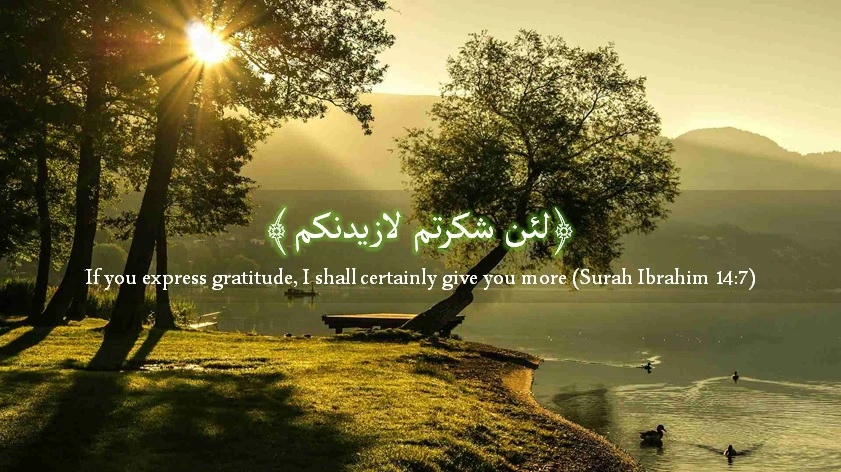The Concept of Gratitude and Thankfulness in the Quran: A Divine Perspective
Gratitude, an expression of appreciation and acknowledgment for blessings received, is a fundamental concept found at the core of many belief systems and philosophies. In the Quran, the holy scripture of Islam, gratitude holds immense significance, emphasized repeatedly as a virtue and a means of spiritual growth.
Gratitude: A Pillar of Faith
In the Quran, gratitude is deeply intertwined with the concept of faith itself. Muslims are encouraged to be grateful to Allah (God) for the blessings bestowed upon them. The act of showing gratitude is seen as a means of strengthening one’s faith and acknowledging the numerous favors and blessings provided by the Creator.
Surah Ibrahim (Chapter 14), verse 7 beautifully encapsulates this sentiment: “If you are grateful, I will surely increase you [in favor]; but if you deny, indeed, My punishment is severe.” This verse highlights the reciprocity between gratitude and abundance. Expressing thanks leads to an increase in blessings, while neglecting gratitude invites the risk of spiritual and worldly repercussions.
Thankfulness: Recognizing Divine Blessings
The Quran repeatedly urges believers to reflect upon the blessings bestowed upon them. From the air they breathe to the sustenance they receive, every aspect of life is regarded as a blessing from the Divine. Surah Ar-Rahman (Chapter 55) poetically outlines numerous blessings in verses that conclude with the refrain: “Then which of the favors of your Lord will you deny?”
Islam encourages individuals to acknowledge these blessings with gratitude, recognizing that all that they have is a gift from Allah. Gratitude is not merely verbal; it should permeate actions and attitudes, leading to a humble and thankful way of life.
Gratitude in Adversity
The Quran also teaches gratitude in adversity. It reminds believers to remain thankful even during challenging times, understanding that trials and hardships can serve as opportunities for growth and reflection. Surah Al-Baqarah (Chapter 2), verse 155-156 highlights this: “And We will surely test you with something of fear and hunger and a loss of wealth and lives and fruits, but give good tidings to the patient, Who, when disaster strikes them, say, ‘Indeed we belong to Allah, and indeed to Him we will return.'”
This perspective encourages believers to maintain gratitude and patience, recognizing that difficulties are part of a larger divine plan and that enduring them with patience and gratitude brings spiritual rewards.
Expressing Gratitude Through Actions
Gratitude in Islam is not confined to verbal expressions. It extends to actions that benefit others and honor the gifts received. Charity, helping those in need, and treating others with kindness are all considered expressions of gratitude. Surah Al-Insan (Chapter 76), verse 9 beautifully captures this: “They [give] food, for the love of Him, to the needy, the orphan, and the captive.”
Ways to Practice Gratitude in Islam
In Islam, practicing gratitude isn’t limited to mere words; it’s a way of life, encompassing actions, thoughts, and emotions. Here are several ways to practice gratitude in accordance with Islamic teachings:
- Daily Thankfulness (Shukr)
- Adkhar (Supplications): Begin and end your day with prayers of gratitude. The Prophet Muhammad (peace be upon him) taught specific supplications for various occasions, expressing gratitude for blessings.
- Reflection (Tafakkur): Reflect on the blessings around you—your health, family, sustenance, and safety—and acknowledge them as gifts from Allah.
- Thanking Allah in Prayer
- Sujood as-Shukr: Prostrate in gratitude (sujood) when something good happens or after receiving a blessing. It’s a powerful expression of thanks to Allah.
- Using Blessings Wisely
- Using Resources for Good: Use your blessings, whether wealth, skills, or time, in ways that benefit others and please Allah. Being charitable and helping those in need is a form of gratitude.
- Being Content (Qana’ah)
- Acceptance and Contentment: Be content with what you have while striving for betterment. Appreciate your current state and avoid unnecessary desires that may lead to ingratitude.
- Gratitude Amidst Trials
- Patience (Sabr): During hardships, maintain patience and trust in Allah’s wisdom. Gratitude during adversity strengthens faith and demonstrates reliance on the Divine.
- Kindness and Good Conduct
- Kindness to Others: Treat others with kindness, respect, and compassion. Acts of kindness reflect gratitude for the blessings bestowed upon you.
- Thanking People
- Acknowledging Others: Express gratitude to people who have helped, supported, or been kind to you. Thanking them is a way of recognizing Allah’s blessings through others.
- Avoiding Complaint and Ingratitude
- Avoiding Complaining: Refrain from complaining about your circumstances. Instead, focus on solutions and maintain a positive attitude.
- Seeking Knowledge
- Gratefulness through Learning: Seek knowledge about Islam and life. Learning about the teachings of the Quran and Hadith helps in recognizing blessings and being thankful.
- Mindfulness and Awareness
- Living Mindfully: Be present in the moment, appreciating every blessing. Mindfulness helps in recognizing and acknowledging the smaller, often overlooked, blessings.

